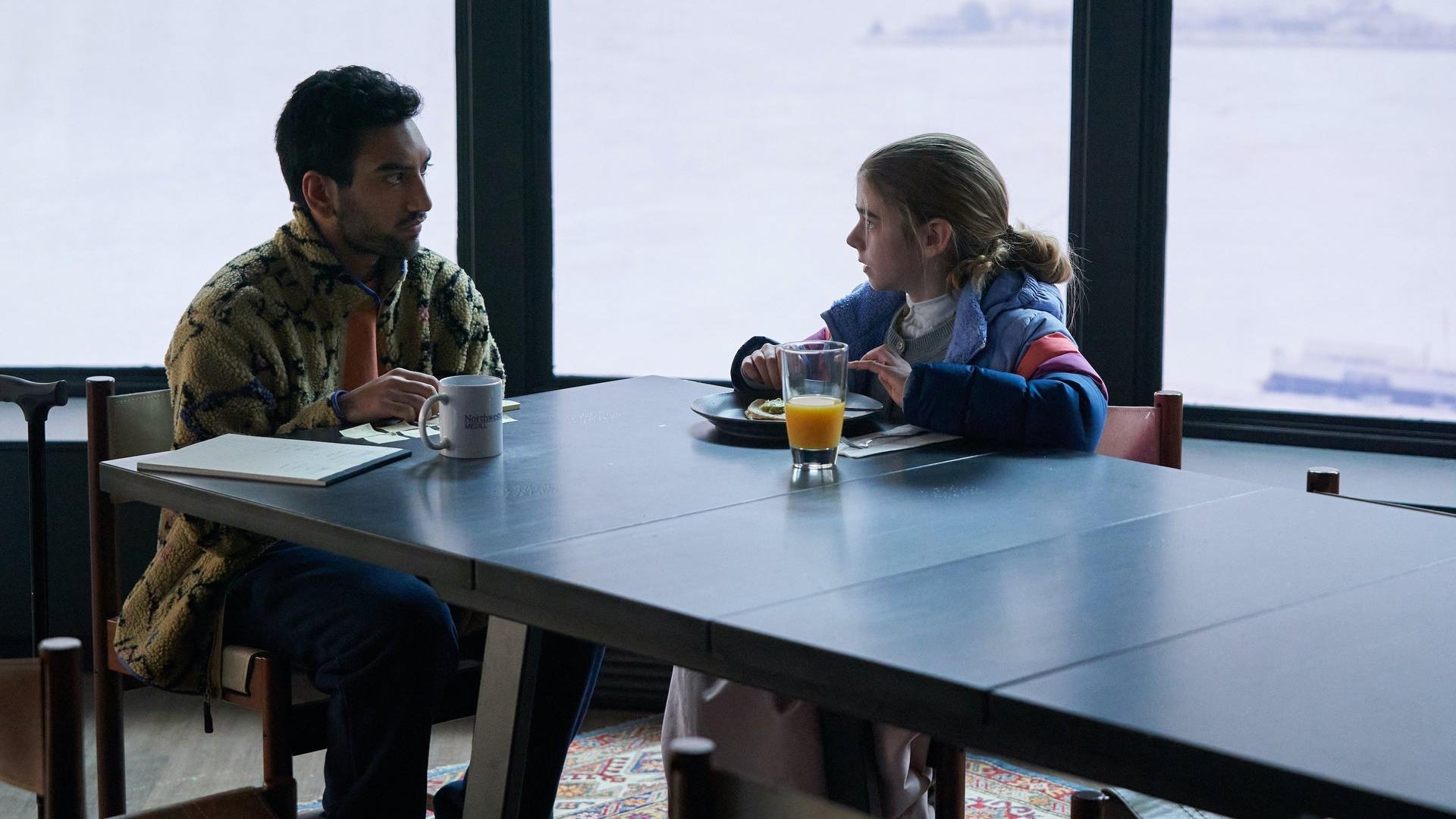Station Eleven plays with memory as it expands on one key character
Flashbacks and callbacks to pre-pandemic times abound in this week's pair of episodes


Station Eleven comes at a weird time of the pandemic—but then, I guess anytime during the pandemic would be a weird time. But I’ve wondered often about the decision to premiere the series over the course of the holiday season and into the new year. While the first few episodes were unwelcome reminders of the scariest parts of 2020, the latest episodes crack the show open, letting shimmers of hope and light shine through.
Am I being maudlin because of the show or because of the time of year? It’s hard to tell. Even the decision to mete out episodes two or three at a time changes the nature of viewing. The cliffhanger at the end of the episode six, “Survival Is Insufficient,” with Kirsten attacked by poison darts, is swiftly dismissed in her hallucination-cum-memory in episode seven, “Goodbye My Damaged Home,” when her younger self gives her the antidote.
By eschewing cliffhangers for the sake of capturing viewers—like they did last week—the writers get to stay present in the emotions of the latter episode, which is focused on Frank.
I love, love, love how the show deals with Frank, especially compared to the book. I hated how doomed the character of Frank was in the book for being in a wheelchair, even though it was a tragic way to underscore how these apocalyptic fantasies in science fiction usually leave out disabled characters. But thanks to Kirsten joining the group, and Frank and Jeevan having a sister, Frank’s personality gets to have a complexity and nuance that is so compelling to watch. It helps that the actor playing Frank, Nabhaan Rizwan, can make a simple stare full of suspense and emotion.
The episode is meant to be a memory seen through 8-year-old Kirsten’s eyes, but newly understood by the 28-year-old Kirsten. It’s a neat memory trick, akin to the BoJack Horseman episode, “Time’s Arrow,” which is told from BoJack’s mom’s perspective, which muddled by her dementia. Both these shows play with memory with an undercurrent of psychological understanding. Of course a 28-year-old Kirsten can tell that Frank didn’t come with them because he was already gone, even if 8-year-old Kirsten didn’t—or couldn’t—piece that together. She also newly understands Jeevan’s discomfort and fear with the situation now that she’s feeling a mirrored version of it with Alex and the traveling symphony.
Ah, Jeevan. Jeevan was my favorite character in the novel, not least because Indian American people rarely even show up in apocalyptic movies, but his characterization here is much less scattershot and more just plain scared. He has very strong “youngest brother energy,” which is illustrated in how Frank urges him to be brave for Kirsten and how Jeevan talks to himself like he’s talking to his sister Sia when he’s trying to self-soothe or figure things out.
Meanwhile, Frank acts as, to quote Pacific Rim, “a fixed point.” He is strong for both Kirsten and Jeevan, even as he himself is struggling with heroin withdrawal and has his own unaddressed pain, the emotional wound of his injury forcing him from being an investigative journalist with Vanity Fair to an autobiography ghostwriter for the rich and famous. I wish we could just get a spin-off where Frank lives, in an uncluttered, non-pandemic world. To yet again bring in a parallel to Pacific Rim, Frank is an older brother whose weighty responsibilities means he feels the need to keep Jeevan at arm’s length.
Again, the timing of “Goodbye My Damaged Home.” How many of us are with, or wishing to be with, our families now? Especially after more than a year under lockdown. How many of us, in contrast, have been with our families so long we’re frustrated that our every move is attached to theirs?
The episode counts down to Kirsten’s play, based on the Station Eleven comic book. She gives Frank the death scene, which feels less like a clunky omen and more like her childhood self picking up on bits of evidence that Frank doesn’t necessarily want to keep going in this type of world. The way his death plays out is a surprise to us all, including those of us who read the book: because Jeevan moved the barricade to go outside, a man breaks in and stabs Frank before Jeevan kills him. That’s the knife that, eventually, Kirsten carries with her everywhere. The moment is a majestic piece of dramatics, like that of a real play—Jeevan is holding Frank’s would-be dying body, refusing to accept it, when Frank gets stabbed and pulls out the knife himself. And then Jeevan, who, just a day ago, debated throwing himself out an open window, has to take Kirsten and leave.
You’ll notice I don’t go too deep into episode six, “Survival Is Insufficient,” which starts a story that we’ll likely see more of next week. It’s also a lesser episode, in every way. The symphony reels from Gil’s death, but we don’t get a good sense of what everyone knows. Alex comes back without seeming to notice that Kirsten is gone. The symphony is taken in by the man who wants them to go to the museum (as noted in the last recap’s comments, I mixed up the museum and the prophet’s group). And after she finds marked would-be graves for the symphony, Kirsten goes to find the Prophet.
There is one scene that stood out to me. The Prophet uses the Station Eleven comic book as a campfire story with the kids, but tells Kirsten he lost the book. He also tells Kirsten how he got it, and how his father’s first wife, Miranda, knew Spanish but his father didn’t know that, and he’d complain about her to his father over the phone in Spanish. This was a scene in “Hurricane,” the Miranda-centric episode. I’m sure Spanish speakers had one over on us on that one, but now we know that Miranda had one over all of us, even then. But how does this kid know that?
But what’s striking is that Kirsten doesn’t take the bait. And why would she? The prophet has killed her friends and preyed on her family. He acts like her trust can be bought and sold, based on ransoming her friends; he persuades with great violence and manipulation. The way he talks about the museum, even, shows how distorted and angry his perspective is. Unlike him, Kirsten has had a real family she could trust, who put her needs first. She knows authenticity when she sees it.
Stray Observations
- The only thing I wish they’d changed about Frank is his name. Sia, Jeevan, and…Frank? Frank?? FRANK???
- The image Kirsten sees of Frank’s apartment is similar to the first few frames of the series, showing cities overrun with greenery. That always reminded me of the hungry greenery in Annihilation.
- Did the conductor tell Dieter she could tell he loved her? I didn’t quite understand that scene.
- How do the kids have the conductor’s glasses, and what glasses is she wearing now? When she throws up on the way to the museum, I thought about the way that disability advocate Imani Barbarin has pointed out that needing glasses—especially a strong prescription—is basically a disability. It’s just not presented that way because so many people need glasses, and the term “disability” usually translates to a lack of aid or representation.
- The red bandanas and Gil’s explanation of them in the beginning of the episode were a weird but interesting peek into the many more tribes of the post-pandemic world.
- Will we ever get an episode where someone doesn’t die? Maybe that’s just too much to ask.